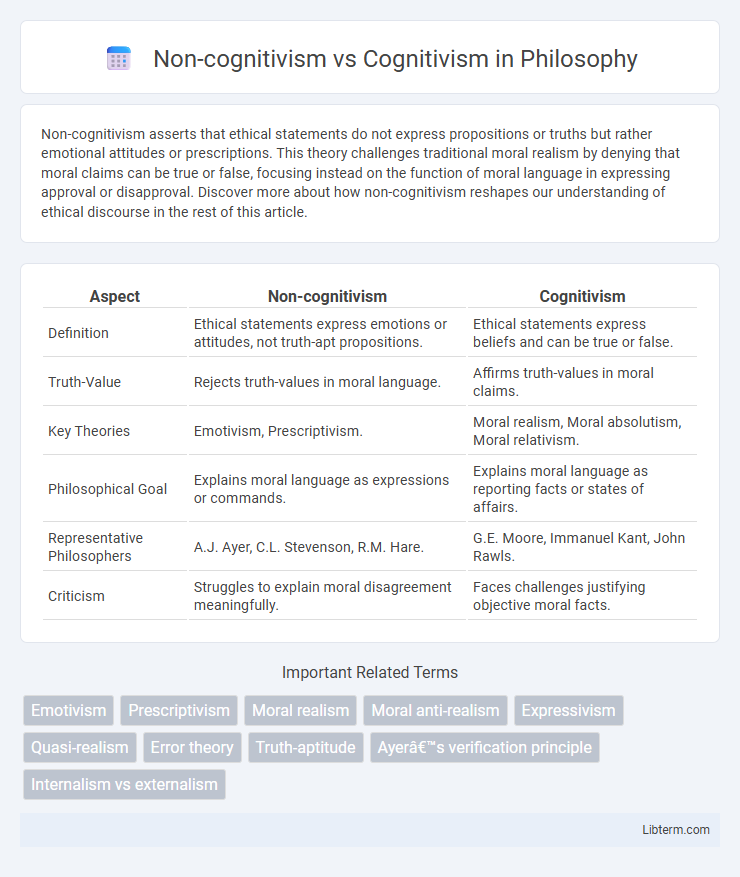Non-cognitivism asserts that ethical statements do not express propositions or truths but rather emotional attitudes or prescriptions. This theory challenges traditional moral realism by denying that moral claims can be true or false, focusing instead on the function of moral language in expressing approval or disapproval. Discover more about how non-cognitivism reshapes our understanding of ethical discourse in the rest of this article.
Table of Comparison
| Aspect | Non-cognitivism | Cognitivism |
|---|---|---|
| Definition | Ethical statements express emotions or attitudes, not truth-apt propositions. | Ethical statements express beliefs and can be true or false. |
| Truth-Value | Rejects truth-values in moral language. | Affirms truth-values in moral claims. |
| Key Theories | Emotivism, Prescriptivism. | Moral realism, Moral absolutism, Moral relativism. |
| Philosophical Goal | Explains moral language as expressions or commands. | Explains moral language as reporting facts or states of affairs. |
| Representative Philosophers | A.J. Ayer, C.L. Stevenson, R.M. Hare. | G.E. Moore, Immanuel Kant, John Rawls. |
| Criticism | Struggles to explain moral disagreement meaningfully. | Faces challenges justifying objective moral facts. |
Understanding Non-Cognitivism: An Overview
Non-cognitivism in meta-ethics asserts that moral statements do not express propositions but emotional attitudes or prescriptions, thus lacking truth value. This contrasts with cognitivism, which holds that moral claims convey objective truths that can be true or false. Understanding non-cognitivism involves recognizing its emphasis on the expressive function of moral language rather than its descriptive capacity.
Defining Cognitivism in Moral Philosophy
Cognitivism in moral philosophy asserts that moral statements express beliefs that can be true or false, grounding ethics in objective facts or truths. This position contrasts with non-cognitivism, which views moral language as expressing emotions or prescriptions rather than truth-apt propositions. Prominent cognitivist theories include ethical realism and moral rationalism, emphasizing the discoverability of moral knowledge through reason and evidence.
Historical Origins of Non-Cognitivism and Cognitivism
Non-cognitivism and cognitivism emerged as central theories in metaethics, with cognitivism rooted in classical philosophy, tracing back to Aristotle's emphasis on moral statements expressing truths or falsehoods. Non-cognitivism developed in the 20th century, notably through A.J. Ayer and the Logical Positivists, who argued that moral language expresses emotions or prescriptions rather than factual claims. These historical origins reflect distinct views on the nature of ethical language, where cognitivism treats moral statements as truth-apt, while non-cognitivism denies this, focusing on the expressive function of moral discourse.
Key Theoretical Assumptions: Non-Cognitivism vs Cognitivism
Non-cognitivism asserts that moral statements do not express propositions or facts but rather emotional attitudes or prescriptions, denying truth values to ethical claims. Cognitivism holds that moral statements are truth-apt, meaning they represent objective or subjective facts that can be true or false based on moral reality or reasoning. This fundamental divergence defines debates on moral epistemology and the nature of ethical discourse within meta-ethics.
Language and Meaning in Moral Statements
Non-cognitivism asserts that moral statements express emotions or attitudes rather than factual propositions, implying that language in ethics functions to influence behavior rather than convey truth. Cognitivism holds that moral language aims to state objective facts, making moral statements truth-apt and subject to verification or falsification. This distinction shapes debates in meta-ethics over whether moral discourse involves descriptive meaning or emotive expression, fundamentally impacting how moral reasoning and communication are understood.
Major Proponents and Influential Theories
Non-cognitivism, championed by A.J. Ayer and Charles L. Stevenson, asserts that moral statements express emotional attitudes rather than factual claims, as detailed in their emotivist theory. Cognitivism, represented by G.E. Moore with his open question argument and the naturalistic fallacy critique, maintains that moral judgments are truth-apt and express beliefs about moral facts. The contrast between Stevenson's emotivism and Moore's ethical non-naturalism underpins the foundational debate on whether ethics is grounded in objective truths or subjective expressions.
Arguments in Favor of Non-Cognitivism
Non-cognitivism argues that moral statements express emotions or attitudes rather than factual claims, explaining the persistent moral disagreement despite shared empirical facts. Its proponents highlight the emotive and prescriptive functions of moral language, suggesting ethical discourse motivates action without asserting objective truth. This perspective also accounts for the variability and context-dependence of moral judgments better than the cognitivist view, which treats them as truth-apt propositions.
Arguments in Support of Cognitivism
Cognitivism argues that moral statements express beliefs that can be objectively true or false, supported by the ability to engage in rational debate and provide justifications for moral claims. Empirical evidence from moral psychology demonstrates humans' capacity to make consistent moral judgments, reinforcing the notion of truth-apt ethical propositions. Philosophical arguments emphasize that cognitivism underpins meaningful discourse in ethics by treating moral statements as cognitive attitudes reflecting factual states of affairs.
Criticisms and Challenges: Comparative Analysis
Non-cognitivism faces criticism for its inability to account for moral disagreement and the meaningfulness of ethical language, as it reduces moral statements to expressions of emotions or prescriptions rather than truth-apt claims. Cognitivism, while maintaining that moral statements are truth-apt and can be objectively evaluated, struggles with the epistemological challenge of justifying moral knowledge and addressing moral relativism. The comparative analysis reveals non-cognitivism's challenge in explaining moral rationality, while cognitivism confronts difficulties in establishing universally accepted moral truths.
Contemporary Debates and Future Directions
Non-cognitivism, which argues that moral statements express non-factual attitudes rather than truth-apt claims, faces challenges in explaining moral disagreement and normativity in contemporary debates. Cognitivism maintains that moral judgments are truth-apt and can be objectively evaluated, fostering ongoing discussions around moral realism and subjectivism. Future directions emphasize integrating empirical insights from psychology and neuroscience to refine the understanding of moral cognition and resolve persistent philosophical tensions.
Non-cognitivism Infographic

 libterm.com
libterm.com